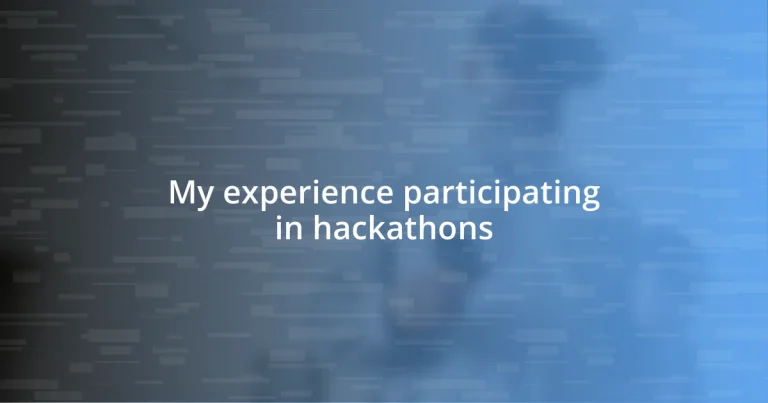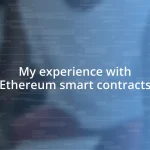Key takeaways:
- Engaging in hackathons fosters collaboration, mentorship, and friendly competition, leading to innovative solutions and lasting camaraderie.
- Preparation and adaptability are crucial; identifying skills, setting goals, and being open to pivoting can significantly enhance the hackathon experience.
- Showcasing projects effectively requires engaging presentations, clear visuals, and the ability to connect with the audience, highlighting the importance of storytelling in tech innovations.
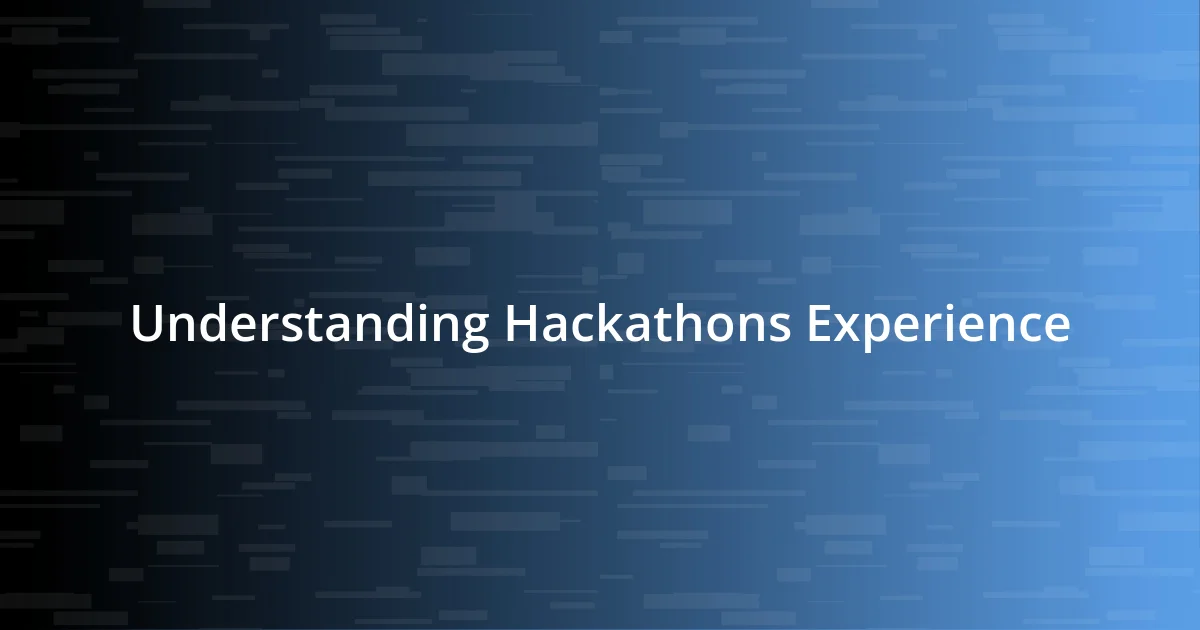
Understanding Hackathons Experience
Participating in a hackathon can feel like diving into the deep end of a pool filled with creativity and innovation. I remember my first experience vividly; the excitement in the air was almost palpable. Have you ever felt that rush when you know you’re surrounded by like-minded individuals who share your passion for technology and problem-solving?
What struck me most was the intense collaboration. Working side by side with teammates who had diverse skills sparked ideas I never would have considered on my own. I often found myself asking, “What if we combined our strengths?” It’s fascinating how often those questions open doors to unexpected solutions and foster a sense of camaraderie that lasts beyond the event itself.
The adrenaline rush during the final presentations is unforgettable. As I stepped onto the stage, my heart raced—not just from nerves, but from the thrill of sharing our hard work with others. There’s a unique joy in being part of something larger than yourself, where your contribution is appreciated and acknowledged. Have you ever wondered how that collective energy propels us to push our boundaries further?
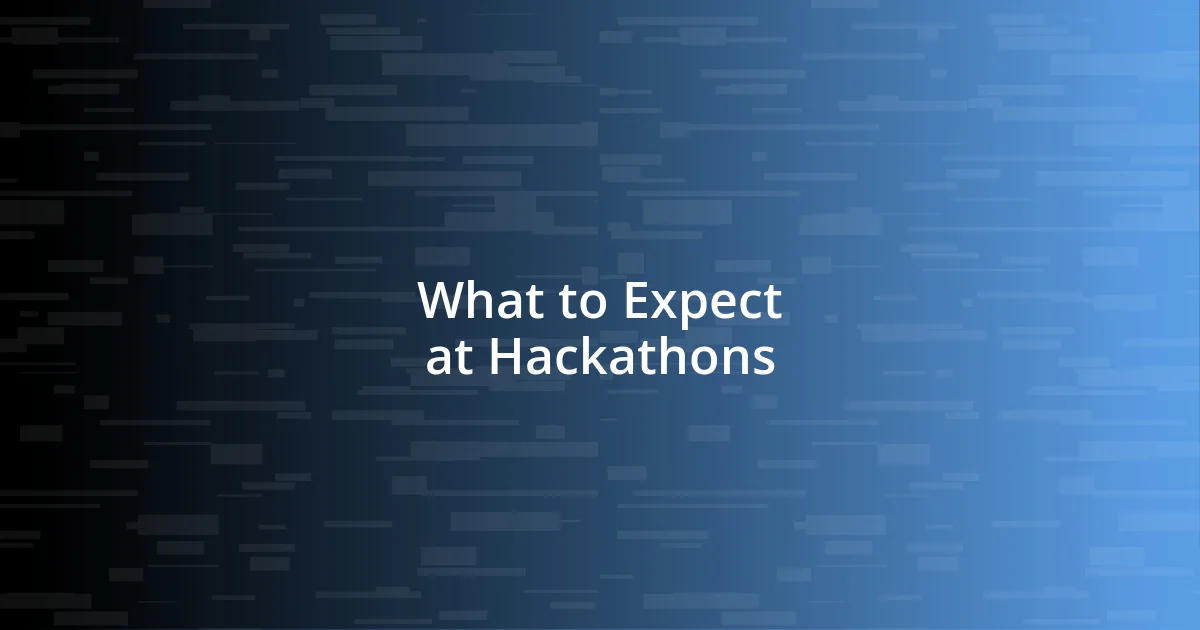
What to Expect at Hackathons
Participating in a hackathon means preparing for an intense, yet rewarding experience. I remember my second hackathon where the energy was electric; teams filled the room with laughter and bursts of creativity as we brainstormed ideas. Imagine being surrounded by people who thrive on innovation—it’s both inspiring and motivating. You can expect long hours, rapid iterations, and a bit of chaos, but amidst that, you discover just how exhilarating teamwork can be.
One important thing to anticipate is the mentorship opportunities that often arise in hackathons. I recall a moment during my third event when a seasoned developer stepped in to guide my team through a technical challenge. Their insights transformed our approach, and that kindness made a lasting impact on my confidence as a budding programmer. These moments of mentorship remind you that the hackathon community is not just about competition but also about learning and growth.
One of the most unique aspects of hackathons is the friendly rivalry among teams. During my first hackathon, I was amazed at how, despite the competitive nature, everyone was cheering for each other. As we all showcased our projects, I felt this overwhelming sense of accomplishment—not just for my own team but for everyone pushing boundaries. It’s a beautiful reminder that at the end of the day, we are all striving to create something meaningful together.
| Aspect | Experience |
|---|---|
| Collaboration | Intense teamwork with diverse skills |
| Mentorship | Guidance from experienced developers |
| Competitive Spirit | Friendly rivalry fostering camaraderie |
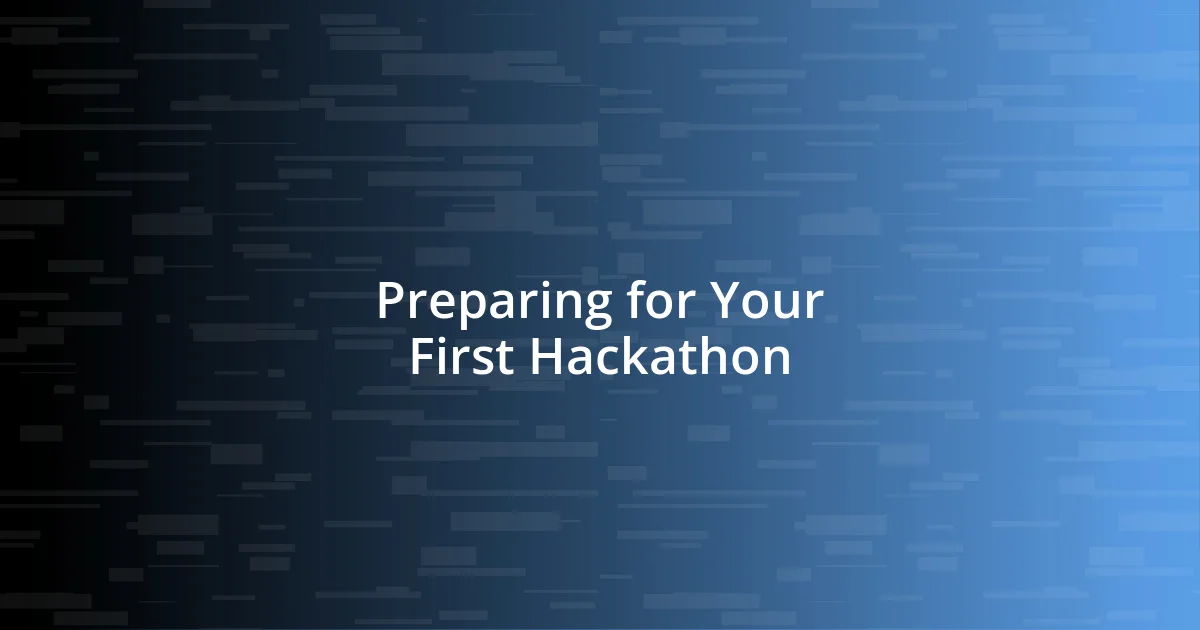
Preparing for Your First Hackathon
Preparing for your first hackathon might seem daunting, but I’ve found that a bit of forward thinking can turn anxiety into excitement. Before my first event, I dedicated a few evenings to brainstorming project ideas and familiarizing myself with potential tools that could help. It’s amazing how a little preparation can build your confidence and ignite creativity.
Here are some practical steps for getting ready:
- Identify your skills: Understand what you bring to the table, whether it’s coding, design, or project management.
- Set clear goals: Decide on what you hope to achieve—be it learning, building a prototype, or networking.
- Assemble your team: Find teammates who complement your skills and share similar goals.
- Research tools and technologies: Get a head start by playing around with new programming languages or frameworks that might be useful.
- Plan your approach: Create a rough outline of your project; it doesn’t need to be set in stone, but having a direction helps.
I can’t stress enough how important it is to relax and keep an open mind. A few days before my first hackathon, I made sure to take breaks and clear my mind. This was invaluable. In the rush of competition, I learned that creativity flows best when you’re not too rigid or stressed. Sometimes, those unexpected ideas that pop into your head during a peaceful moment can lead to the most innovative solutions!
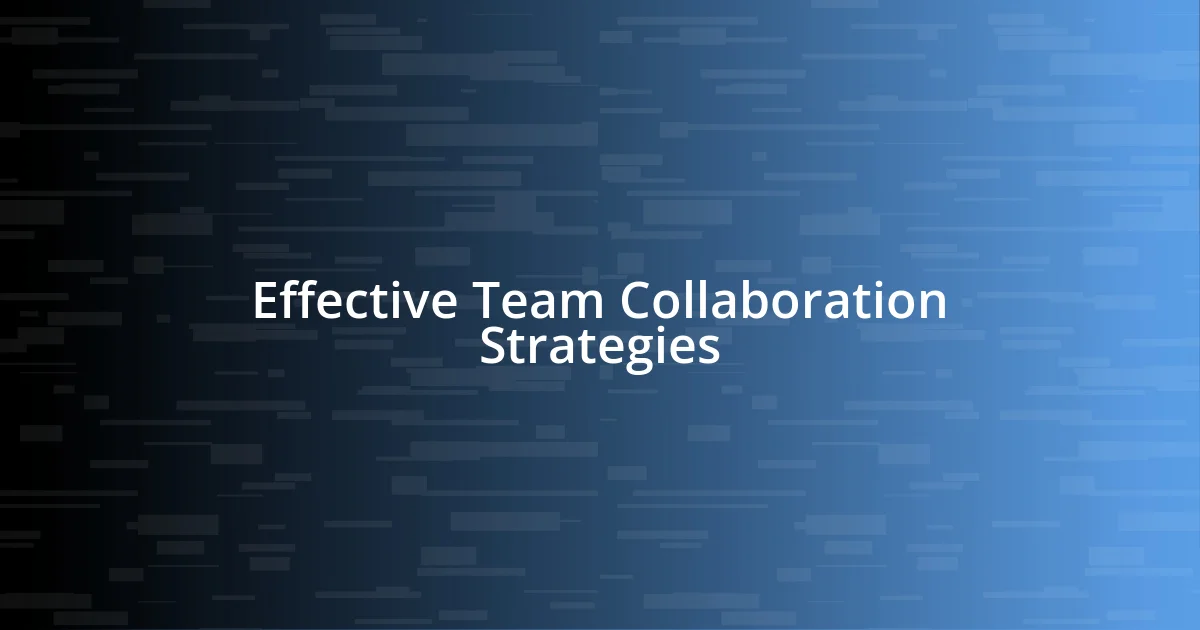
Effective Team Collaboration Strategies
Effective communication stands at the heart of successful teamwork during a hackathon. I once found myself in a group where everyone was talented but not openly sharing their thoughts. It was like being in a room full of potential but no one was speaking. By suggesting short daily check-ins, we gradually broke down those walls. Suddenly, ideas flowed, and our project took on a life of its own. Have you ever experienced the sheer joy of watching a concept evolve because everyone was on the same page? It’s a game-changer.
Another strategy that worked wonders for my team was defining roles early on. In a previous hackathon, we took a few minutes to assess our strengths and assign specific tasks accordingly. I remember feeling a weight lifted off my shoulders when I knew exactly where I fit into the project. This clarity fueled our efficiency and minimized overlap, allowing us to focus on our respective parts. Why struggle to juggle multiple responsibilities when collaboration can be so streamlined?
Lastly, embracing flexibility can catalyze innovation. During one particularly intense hackathon, our initial idea started to crumble due to technical limitations. Instead of panicking, we pivoted our focus, brainstorming ideas on the fly. That willingness to adapt led us to a concept we hadn’t even considered, which ultimately won us the best project. Isn’t it fascinating how the best ideas often arise from challenges? Embracing change unleashes creativity in ways we might not anticipate, so keeping an open mind is crucial for any team!
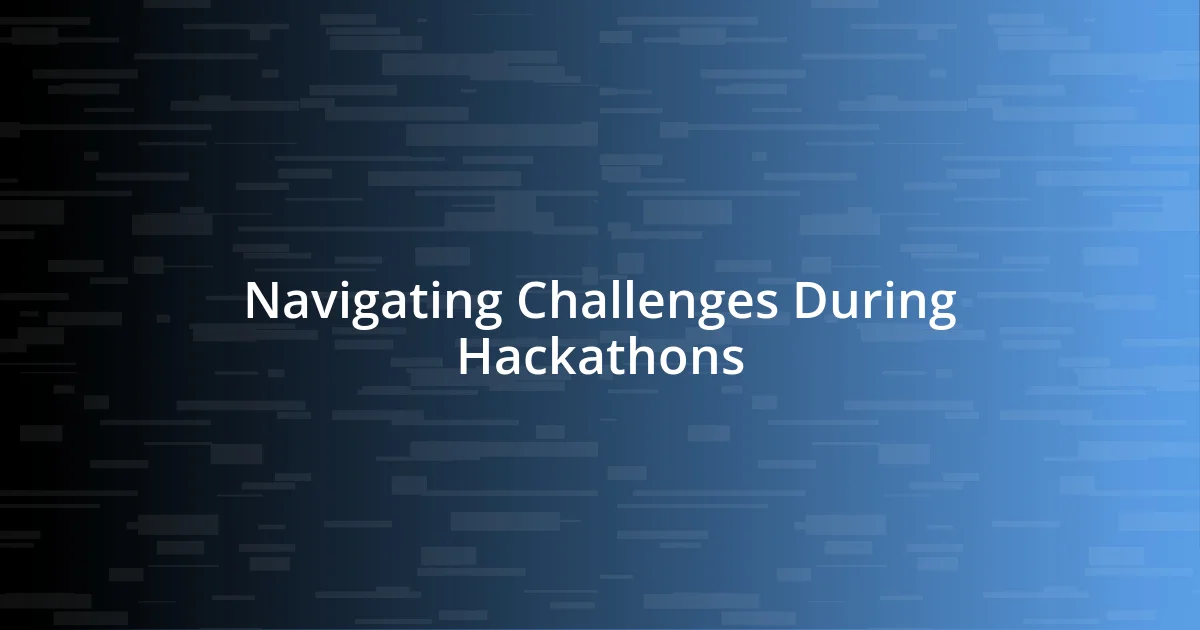
Navigating Challenges During Hackathons
Navigating challenges during hackathons can be quite an adventure. I remember a moment during one competition when our internet connection dropped suddenly. Panic washed over my team as we scrambled to find a solution. Instead of letting frustration take over, we decided to leverage our mobile data for a quick fix. That little moment of resilience made me realize how important it is to stay calm and think creatively under pressure. Who knew that a simple internet outage could lead to thinking outside the box?
Sometimes, the biggest hurdles aren’t technical; they’re about time management. I once found myself in a situation where we underestimated the time needed to complete our project. It felt overwhelming, and I could sense the anxiety in the room. To tackle this, we regrouped and broke our tasks into smaller, more manageable pieces. Then we set short, achievable milestones. This shift not only fostered a sense of accomplishment but also enhanced our focus. Have you ever changed your approach to find success where you thought you could fail?
Moreover, interaction with mentors can also help smooth out rough edges. At one hackathon, I took the time to seek feedback from experienced participants who had gone through the same challenges. Their insights were gold, not just in terms of technical advice but also in understanding the dynamics of teamwork in a timed environment. It made me appreciate how much we can learn when we reach out for help. Isn’t it incredible how collaboration and guidance can turn obstacles into stepping stones?
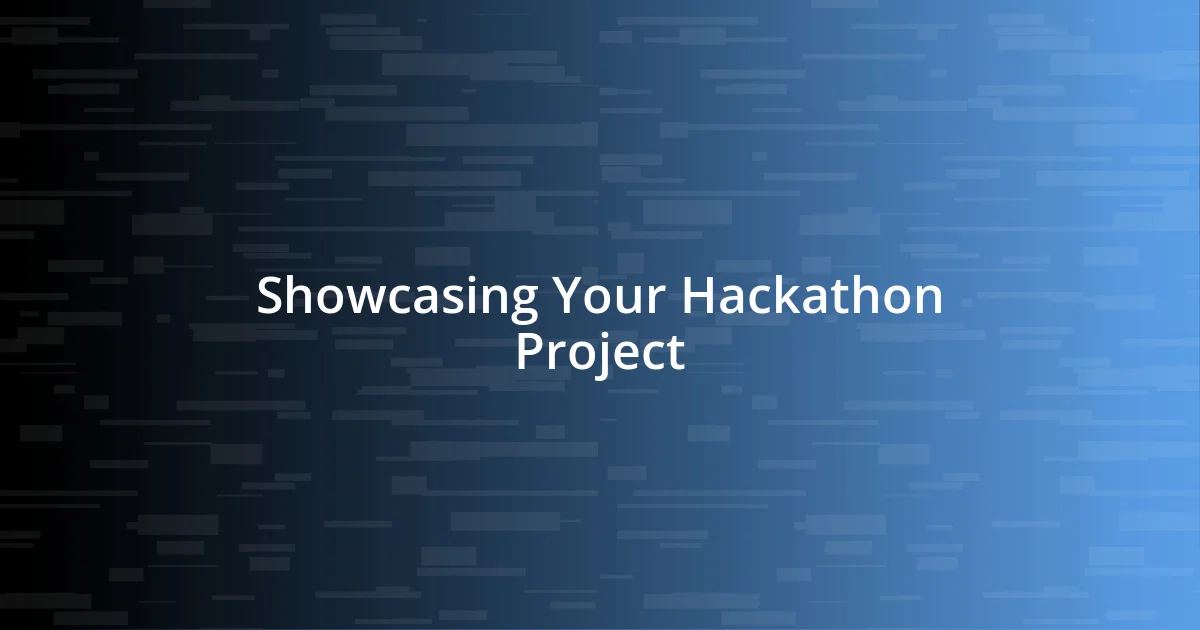
Showcasing Your Hackathon Project
Showcasing your hackathon project is a thrilling opportunity to share your team’s hard work and creativity. At my first hackathon, we designed a mobile app that aimed to make grocery shopping more efficient. When it came time to present, I felt a rush of excitement mixed with nerves. We practiced our pitch multiple times, and as I stood in front of the judges, I realized how passionate we were about our creation. Isn’t it remarkable how a well-rehearsed presentation can turn an idea into a captivating story?
Engaging your audience is essential during the showcase. I vividly remember using live demos to illustrate our app’s features. Watching the audience interact with our project brought an indescribable thrill. Their genuine reactions reminded me that showcasing is not just about talking; it’s about creating a connection. It’s amazing how a quick demonstration can shift the atmosphere from a formal presentation to an engaging conversation. Have you ever noticed how excitement builds when people can actively participate?
When preparing for the showcase, I learned that visuals can make or break your presentation. In one hackathon, we used eye-catching graphics and simple charts that highlighted key points of our project. Seeing the judges lean in and take notes was incredibly rewarding. It made me realize how important it is to create a visual narrative that complements your story. After all, isn’t a compelling visual just as important as the message itself? This experience taught me that clarity and presentation can amplify the impact of your project, making it unforgettable.
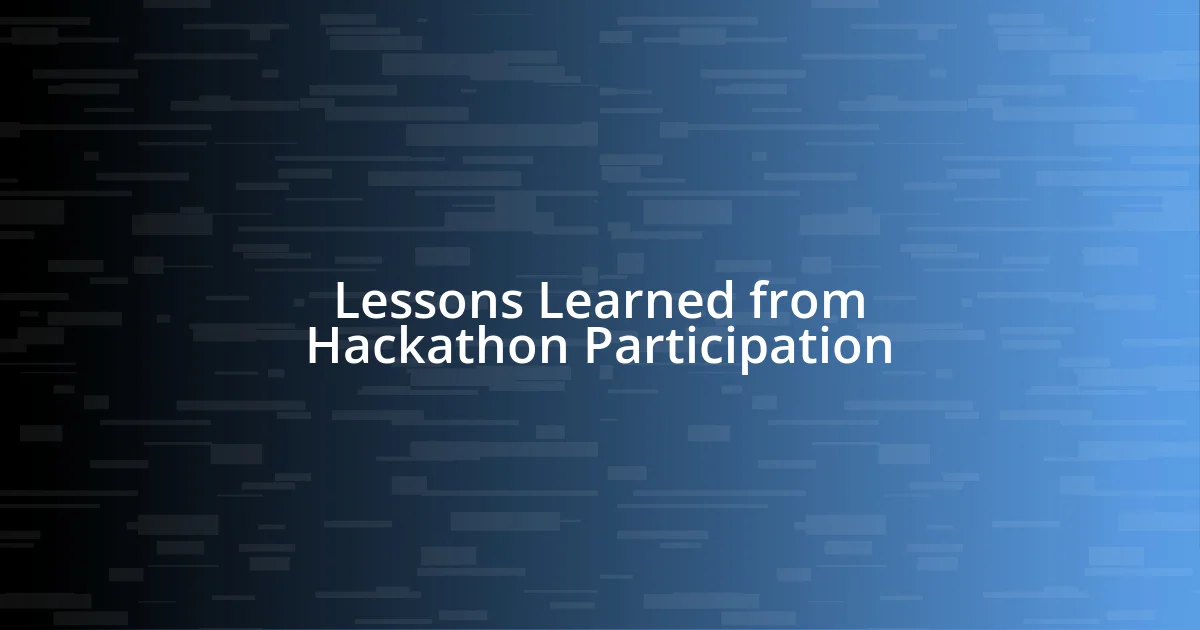
Lessons Learned from Hackathon Participation
Participating in hackathons taught me the value of adaptability in a fast-paced environment. I recall a time when our original project idea fizzled out just hours into the competition. Instead of panicking, we took a step back, brainstormed new concepts, and pivoted to create a solution that resonated deeply with our interests. This experience underscored how flexibility can lead to unexpected yet rewarding outcomes. Have you experienced a shift in plans that ended up being a fantastic decision?
Another crucial lesson was the significance of diverse teamwork. I was part of a group where each member brought unique skills to the table—coding, design, and market strategy. What struck me was how our different perspectives amplified our creativity. I remember a moment when a design-oriented teammate proposed a feature that fundamentally changed our app’s user interface for the better. It was a lightbulb moment, reminding me how collaboration can spark innovation. Doesn’t it feel great when everyone’s strengths combine to create something extraordinary?
Lastly, I learned the importance of post-event reflection. After one of my hackathon experiences, I gathered my team to discuss what went well and what could improve next time. It was eye-opening. We initially thought our main success was just the final product, but it turned out that the relationships we built and the lessons learned along the way were just as valuable. This reflection process not only deepened our connections but also refined our skills for future challenges. How often do we take the time to reflect on our experiences for deeper growth?












